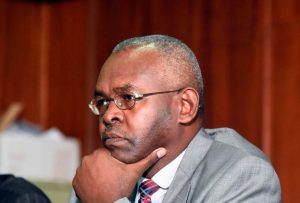
Her Excellency First Lady Margaret Kenyatta with Her Excellency Anita Herczegh the First Lady of the Republic of Hungary, when they held talks at State House, Nairobi. Her Excellency First Lady Anita Herczegh is accompanying her spouse, President János Áder who is on a four-day State Visit of Kenya.[Photo/Courtesy]
First Lady Margaret Kenyatta has commended locally owned agro-processing factories for supporting the industrialization pillar of the Government’s Big 4 Agenda.
Speaking on Monday during a tour of Maramba Tea Factory, accompanied by her Hungarian counterpart Anita Herczegh, Margaret said the processors were helping create employment and wealth for host communities.
Maramba Tea Factory in Limuru, Kiambu County is a farmers’ enterprise that mostly employs women as tea pluckers and provides livelihoods to over 2000 households.
The factory tour provided an opportunity for visiting Hungarian First Lady to get a first hand experience of the Kenyan tea value addition process right from the farm to the cup.
In her remarks at different stages of the tour, First Lady Herczegh praised Kenyan tea farmers and processors for consistently producing high quality tea both for export and domestic consumption.
Earlier at State House Nairobi, First Lady Margaret Kenyatta and her Hungarian counterpart held talks that centred on women empowerment, maternal and child health.
First Lady Anita Herczegh is companying her spouse President János Áder who is on a four-day state visit of Kenya at the invitation of President Uhuru Kenyatta.
According to Kenya Investments Authority(KenInvest) Republic of Kenya is regarded as the regional hub for finance and trade in East Africa. Kenya’s main port, Mombasa, is the largest seaport in East Africa that serves as a gateway to many other East and Central African nations
as well, many of which are land-linked. Kenya has a population of approximately 44.86 million (2014), out of which an estimated 26 million lies in the working age group of 15–64. Kenya also has one of the largest youth populations in Africa, with almost 16 million people lying in the age group of 15–34 years. By 2050, it is expected that Kenya’s total population will cross 97 million, with a working age population of approximately 60 million.
Kenya has a strong banking sector, and its legal, regulatory and accounting systems are transparent and consistent with international norms. There are no exchange controls after the 1994 liberalization, which removed all restrictions.Kenya’s banking sector consists of 43 commercial banks, out of which 13% are either 100% foreign owned or have significant foreign share









